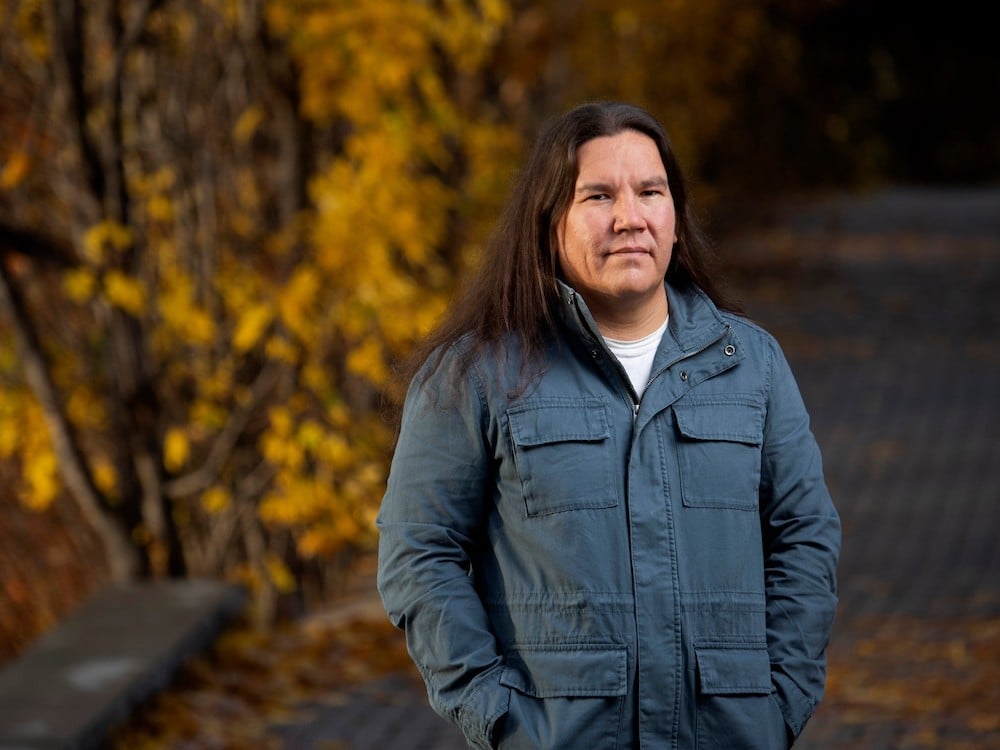- Moon of the Turning Leaves
- Penguin Random House (2023)
In Vancouver to do a reading at Iron Dog Books this fall, Waubgeshig Rice is an affable, easy presence. While the solitary aspects of writing are a world away from the far more social part of readings, book tours, interviews and meeting with readers, Rice enjoys the more public parts of the process. The Anishinaabe author is a former journalist, and his love of people is clear in his magnetic presence in the room.
He is the kind of author who people feel compelled to connect with after reading his work. While he wasn’t planning to write Moon of the Turning Leaves, the book he’s reading tonight, it was his readers who spurred him on. They kept asking Rice about the possibility of a sequel to his 2018 bestselling novel Moon of the Crusted Snow; Moon of the Turning Leaves is his book-length response to those questions.
Rice’s work is part of a groundswell of futuristic genre storytelling that includes filmmakers like the late Jeff Barnaby (Blood Quantum), Danis Goulet (Night Raiders) and Nyla Innuksuk (Slash/Back). All of these stories step into surrealist realms of science fiction and speculative fiction, but they are anchored by their full-throated responses to the pervasive, insidious forces of real-life oppressions. So it is in Rice’s latest novel, too. In the aftermath of total societal collapse, white supremacists and gun nuts have raised their bearded, crusty heads.
Science fiction set in the apocalyptic near future has been described by other writers of the genre as a form of documentary. In this aspect, Rice’s experience as a journalist was an invaluable resource in imaging a possible future. He situates himself firmly in the camp of hope — nothing makes this more apparent than Moon of the Turning Leaves’ introduction, dedicated to the birth of a new baby girl. Attended by midwives, family and friends, the birth is a joyous event.
Unlike other works of dystopian fiction where hope is in thin supply, the collaborative and supportive networks underscoring Rice’s novel infuse Turning Leaves with a welcome, if grim, sense of optimism.
The larger idea at work in Rice’s writing is the collective approach to survival, which has always been part of Indigenous culture. In a world where western ideals of individualism have essentially crashed and burned, people coming together to share resources and support each other and acting in solidarity and in concert with the rhythms of the natural world is the only way forward.
Despite the terrors of a post-apocalyptic world, there is something very compelling about this place. It’s little wonder that the narrative possibilities inherent in a largely emptied-out world are so fascinating to writers and filmmakers. The sticky web of contemporary life is stripped away, and the real stuff laid bare.
Family, love, loyalty, sacrifice and courage are far easier to see in a story like Turning Leaves, where the stakes are vertiginously high, life or death waiting just around the bend in the trail.
An Indigenous hero’s quest
In Moon of the Crusted Snow, western society comes to a screeching halt when a massive power disruption shuts down the usual modus operandi. To survive, a small group of Anishinaabe people, led by a man named Evan Whitesky, flees the chaos and fashions a community in northern Ontario. In addition to incorporating traditional methods of living off the land, the group comes together to support each other as the darkness rises. The arrival of a predatory white man named Justin Scott sets loose the very worst of humanity. Before long, coercion, violence and cannibalism have set the stage for a final confrontation between Indigenous people and white interlopers.
This initial story was prompted by Rice’s real-life experience when a large-scale blackout in 2003 suspended normal life in large parts of Eastern Canada and the United States. At the time, Rice was at home with his family. As he explains, “We really thought, ‘This is it.’”
In spite of the uncertainty, Rice realized that he was in a good place if the world was indeed ending, surrounded by people who knew how to survive, hunt, fish, gather medicine and live off the land. Rice and his brothers were getting ready to go fishing the next day when the power returned, but the idea for a story remained. At the time, Rice was working as a journalist, but the success of Crusted Snow allowed him to leave his job and write full time.
Moon of the Turning Leaves is set 10 years after the events in Crusted Snow. Evan and his family, along with a number of other families, are still living in a remote part of Ontario. In the ensuing decade, their group has grown, new babies have arrived, and a few folks have joined. But not everything is looking rosy. The fish in the nearby lake have grown thin and small, and other animals like deer and moose know to avoid the area and its human inhabitants.
The kids who were small at the time of the blackout have grown into teenagers and young adults. The only things they know of the fabled south are stories and the threadbare tools that the adults took with them when they journeyed north. With dwindling supplies and more people to feed and take care of, the pressing need for additional resources has led to something of a crisis point. For the community to survive, they need to find another place to call home, to allow the land to replenish.
Although two members had previously undertaken the journey south, the fact that they never returned is a lingering source of grief. Despite misgivings, a decision is made: a small group will retrace their path, get the lay of the land and potentially scout for another home.
As Evan, his daughter Nangohns and the rest of the group set forth with just a faded and ragged map, they have only memories of what once existed in the “before times” to guide them. Soon enough, they encounter unexpected dangers. Not everyone is going to make it home.
A call for the preservation of traditional knowledge
Dystopic tales have been thick on the ground in the last few years. Cormac McCarthy’s post-apocalyptic novel The Road (2006) gave way to the 2009 movie of the same name. In more recent years, we’ve seen death by mycelium in the Last of Us television series. But Rice’s books take a different approach, setting the apocalypse that has already taken place for Indigenous people against the wider collapse of western society.
It is a powerful metaphor that runs beneath both novels. In Turning Leaves, Rice builds the structure of a journey to provide additional complexities. From Homer to Tolkien, the hero’s quest is one of the foundational human narratives. In Turning Leaves this classic structure, taken from an Indigenous perspective, offers a deeper take on the age-old story of survival.
The thing that is most apparent in Turning Leaves is how critical it is to maintain traditional knowledge. In this aspect, parts of the book recall Jane Jacobs’ seminal 2004 work Dark Age Ahead.
In Dark Age Ahead, Jacobs explores how knowledge once lost is terribly difficult to rediscover. She writes:
We in North America and Western Europe, enjoying the many benefits of the culture conventionally known as the West, customarily think of a Dark Age as happening once, long ago, following the collapse of the Western Roman Empire. But in North America we live in a graveyard of lost Aboriginal cultures, many of which were decisively finished off by mass amnesia in which even the memory of what was lost was also lost.
As Rice’s work makes clear, this kind of amnesia was, in fact, not total.
Repositories of human memory and storytelling allow for a continuity of survival. Living bodies of knowledge and understanding are passed on from one generation to the next: a light in the darkness. ![]()
Read more: Indigenous, Books

















Tyee Commenting Guidelines
Comments that violate guidelines risk being deleted, and violations may result in a temporary or permanent user ban. Maintain the spirit of good conversation to stay in the discussion and be patient with moderators. Comments are reviewed regularly but not in real time.
Do:
Do not: